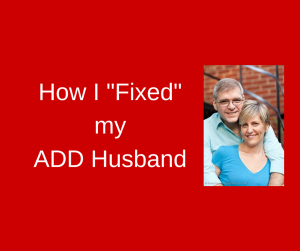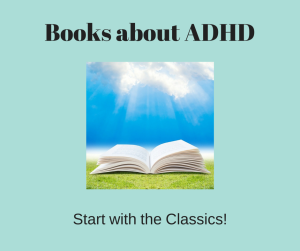By Coach Linda Walker
Yesterday, my husband, Duane, and I celebrated 29 years of marriage. I would like to say it was all blissful, but I’d be lying and I’m a terrible liar. (Not the anniversary! That was wonderful! I mean the 29 years of marriage!)
Until Duane received his diagnosis of ADHD in 1996, neither of us knew what the problem was. Duane and I struggled with dividing household chores (the struggle was not in dividing them, I did it all despite his best efforts and promises to do better), with our finances and the added pressures of Duane’s frequent job changes as he became bored with or lost his jobs. Under so much pressure, we fought… a lot. Duane’s impatience and emotional outbreaks affected our relationship and his relationship with our daughters. The entire family was dysfunctional.
After his diagnosis, Duane began his journey toward embracing the positive and overcoming the negative aspects of his ADHD. Duane and my youngest daughter, as is quite common, received their ADHD diagnosis around the same time – Kyrie was diagnosed first and as we read about her situation, light bulbs went on about Duane’s struggles. And while only Duane and my youngest were diagnosed, I think of us as a family with ADHD. We could only solve this problem working together, and so this was as much my journey as theirs.
Today, as an ADHD coach, when I work with an adult ADHDer, some of our biggest challenges are with the spouse. And I get it. Been there, done that! Being a member of a family with ADHD can be exhausting, nerve-wracking and absolutely frustrating. And I think what I found most frustrating is that I thought I had no control over anything. Once I learned that there were some things I could do to make life with ADHD better for all of us, the building process began and the frustration diminished.
Here’s what I did to fix Duane:
- First, I changed my mindset. I realized that I wasn’t the only one suffering in the family. I know Duane had it worse than me – he was living it 24/7. He wanted to be a better partner and a more patient father. Our daughters suffered too. They saw their parents constantly worried, fighting or impatient. Kyrie struggled with her ADHD and learning disabilities, and our oldest daughter, Jennifer, felt neglected as all our efforts were directed at helping Kyrie and Duane. Duane wasn’t the only one who had some work to do, I did too. As parents, we feel for our children and would do anything to make their hurt stop, after all they didn’t ask for this. Oddly enough, we don’t always feel the same empathy towards our spouses with ADHD (even though they didn’t ask for it either!) I let go of my martyrdom and embraced empowerment, realizing that at any given moment, people do the best they can with what they know at the time.
- I learned all I could about ADHD. I didn’t just learn so I could help my daughter (which as a mother, I would do without question) but also for my husband. The more I knew, the more empowered I felt. I read books, listened to webinars and went to conferences on ADHD. Attending our first ADDA Conference as a couple was a life-changing event. We both learned so much, met other people coping successfully with what we were going through and left empowered.
- I became part of the solution. Duane struggles with several aspects of ADHD, but the worst is his short-term memory, which IS an ADHD problem. So why was I asking him to do things or to pick things up at the store when he didn’t have a pen and paper or his PDA to take notes? I also often asked him to help when he was tired or distracted. How likely was that to turn into a positive situation? It was only when I was willing to let go of the way things were done and turn responsibility over to Duane that we began to make progress. He told me he’d take over certain tasks… if he could do it his way. He took over the grocery shopping. I offered my help if he needed it (secretly thinking we’d probably starve to death waiting for Duane!) To my surprise, he created his own system for doing it (don’t ever tell him I said this, but it’s much more efficient than the way I did it!) and we’ve never looked back.
- I took care of myself. I lowered my standards on things that didn’t really matter much, especially in the beginning. So what if I didn’t clean the house EVERY week and cook ALL my meals from scratch? Instead of chasing dust bunnies, I spent time with friends to relax and return to my family a lot more ready to laugh as freak out at the wacky situations most ADHD families encounter regularly.
- The most important thing I did was to notice any positive changes. As Duane began to work with his physician and his coach, I avoided nagging about what wasn’t yet addressed – change takes time – and made sure to notice what was moving in the right direction. And I was sure to let him know how much I appreciated it.
There are several other things we did to improve life as an ADHD family. We learned to communicate better how we felt rather than blaming, and we shared our dreams and aspirations. We started dating again; no, we didn’t have much money back then, but using Duane’s vivid imagination, we found fun things to do that cost little or no money. We didn’t get bogged down by social norms of gender roles and what constitutes woman’s work and man’s work, opting instead to take on the jobs around the house that we were better at or liked more.
We even created our own secret language to use discretely in public (I could provide Duane with cues to appropriate behavior in social situations, for example. And he could signal when he couldn’t take another minute of the 47 family members sharing a cabin in the woods for Christmas anymore and needed a break for some peace and quiet.)
And so now 29 years later, here we are still married, and much, much happier. We laugh a lot more and fight a lot less. I can safely say that Duane is my best friend and I, his. Was it easy? Absolutely not, but I’m proud of what we’ve accomplished together and I know it was definitely worth it.
By Linda Walker. Linda Walker, PCC, B. Admin., is a certified ADHD Coach who helps adults with ADHD overcome the special challenges of Attention Deficit Disorder (ADHD) they encounter at home and in the workplace. She is the creator of The Maximum Productivity Makeover for Creative Geniuses, a training program for adults with ADHD and the author of With Time to Spare. http://www.CoachLindaWalker.com Originally Posted May 7, 2013 http://coachlindawalker.com/heres-how-i-fixed-my-adhd-husband/
Photo modified on Canva
Follow ADHD / ADD freeSources’s board Couples and ADHD on Pinterest.





